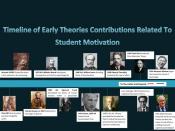Experiment # 1
The Effect of Reinforcement on Performance
&
The Difference in Self-Efficacy Levels in Terms of Different Levels of Reinforcement
Abstract
This study was conducted to see the effect of reinforcement on performance, and the relationship between levels of self-efficacy and the level of reinforcement provided. The hypothesis was formulated that the reinforcement provided would increase the performance of participants, and that the performance of the highly reinforced group would be better than that of the moderately reinforced group and of the control group. It was also hypothesized that there would be a measurable difference in self-efficacy levels in terms of different levels of reinforcement provided, with self-efficacy increasing as the levels of reinforcement increased. 54 participants aged between 18 to 25 years were selected through the convenient sampling method from different departments of the University of Karachi. After the calculation of the results, it was found that one part of the hypothesis was proven (the highly reinforced group performed better than the moderately reinforced and control group) but one part was not proven (reinforcement did not consistently improve performance).
Furthermore, the hypothesis that self-efficacy would improve as reinforcement increased was also disproved.
Introduction
Motivation is the psychological feature that arouses an organism to action toward a desired goal. It elicits, controls, and sustains certain goal-directed behaviors. Motivation involves the biological, emotional, social and cognitive forces that activate behavior.
There are innumerable factors which may affect a person's motivation to do something. Most of these factors can be divided into either internal factors or external factors. Motivation which is driven by internal factors is called intrinsic motivation. Intrinsic motivation is based on taking pleasure in an activity rather than working towards an external reward. For example, a student who studies a subject because he is interested in learning...


